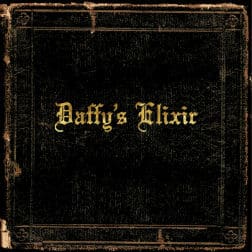Artist: Bryan Scary and the Shredding Tears
Album: Daffy’s Elixir
Though my wife would cheerfully admit that I’ve discovered a lot of her favorite music for her, I plan my listening around the differences in our tastes. A small percentage of albums — 2012 examples include Regina Spektor, Amanda Palmer, Jesca Hoop, Birdeatsbaby, and (one of these is unlike the  others) Serj Tankian — I am encouraged to play. The majority of the music I like is acceptable, and ignorable, as long as things haven’t been too crappy at her job. Some music earns either a curt “Please turn that off” or a “What are you listening to?” inquiry in a tone of voice that I recognize as meaning the same thing; but I’ve learned the patterns, and don’t bother her as long as in her presence I play nothing especially progressive, abrasive, hip-hop, trebly, bizarre, or foreign-language-sung.
others) Serj Tankian — I am encouraged to play. The majority of the music I like is acceptable, and ignorable, as long as things haven’t been too crappy at her job. Some music earns either a curt “Please turn that off” or a “What are you listening to?” inquiry in a tone of voice that I recognize as meaning the same thing; but I’ve learned the patterns, and don’t bother her as long as in her presence I play nothing especially progressive, abrasive, hip-hop, trebly, bizarre, or foreign-language-sung.
But then there’s her reaction the first time she heard Bryan Scary and the Shredding Tears: amused disbelief. “Are you listening to this on purpose?” {I was} “… It’s so cheesy! And ’70s!” Now, rather than sniping about an INXS fan calling anyone’s music “cheesy”, I will take the high road and concede her points. *If*, by cheesy, we mean that Bryan Scary albums are full of extravagant pop songs, built with the obvious goal of giving us pleasure. As for the other part, well, yeah: singing in a compromise between Paul McCartney’s playfulness, the helium-voiced purity of Sparks’ Russell Mael, and the rich auto-harmonies of Queen’s Freddie Mercury, he keeps trying to make the best album of 1976. Fortunately for me, I believe he keeps succeeding. Three albums into this career, he’s even managed to do so with an odd sort of continuous artistic growth.
When recommending his 2006 debut the Shredding Tears (a one-man performance except the drums) to my friends, I compared it to a great lost but now remastered collaboration between Paul McCartney’s Wings and early Sparks: lightweight, but bursting with bright, long-form melody. Lyrics nodded to the honorably silly tradition of Maxwell’s Silver Hammer; even highly literate ballads like Ceiling on the Wall ended up in places like “I’ve lost my marbles, now what can I do?/ Don’t let them take my brain!!”.
When Scary hired a talented backing band, the Bryan Scary and the Shredding Tears 2008 follow-up Flight of the Knife earned a broader range of comparison. To Wings and Sparks, I now added references to Queen and high-energy-mode Elton John, plus hints of Jesus Christ Superstar, early disco, Dr. Teeth & the Electric Mayhem, and on my favorite song (Purple Rocket) the fieriest rock aspects of Yes. (Why *wasn’t* South Side of the Sky recorded in collaboration with the Muppets, anyway?). A ludicrous concept album about blimps, airplanes, spaceships, and cross-solar-system diplomacy, Flight of the Knife was, for me, one of the most happiness-producing records ever made.
It took four years to follow up with Daffy’s Elixir. A story album about (as the website announces) “cons, quacks, cowgirl robots, spurned lovers, villains, and bandits”, it unsticks Bryan Scary in time. It is somewhat set in the legendized version of Old West, gold rushes and gunfights and  territorial land grabs. Silver Lake Mining Company‘s narrator promises “We’ll put our little world behind us. We’ll let prosperity define us. We’ve got a miracle to guide us. And pretty soon we’ll all be miners”. The protagonist of Faintness Moody: Outlaw defines himself by his pursuit of a gunfighter rival from town to town, jealous of his success at old-fashioned bank robbery and escape across the border. But the album’s also set in the Hollywood that produced those Wild West dreams. The Ballroom Kid is “gonna tango into your saloon” and “kill you slowly after a pirouette”; that mining company’s Diamonds “brighten the balustrade about you” and “dot the eyes of every film star at The Mirage”; and Another Ace in the Hole stars a newspaperman who believes he created a starlet who’s left him behind. Then again, Cable Through Your Heart , linguistically set among “maidens fair” and “buccaneers”, selects among cable TV channels; Quicksilver Daisy Day describes love on a broken battleship with simulator holograms; the favor collector in Owe Mister O lives in the era of “in his office 9-to-5” and the era of “vagabonds”, “the butler and baker and new-age tailor”, and “the pioneer, the dancing sailor” all at once. By album’s end, caped Supermen headed West are seeking the peak of Data Mountain.
territorial land grabs. Silver Lake Mining Company‘s narrator promises “We’ll put our little world behind us. We’ll let prosperity define us. We’ve got a miracle to guide us. And pretty soon we’ll all be miners”. The protagonist of Faintness Moody: Outlaw defines himself by his pursuit of a gunfighter rival from town to town, jealous of his success at old-fashioned bank robbery and escape across the border. But the album’s also set in the Hollywood that produced those Wild West dreams. The Ballroom Kid is “gonna tango into your saloon” and “kill you slowly after a pirouette”; that mining company’s Diamonds “brighten the balustrade about you” and “dot the eyes of every film star at The Mirage”; and Another Ace in the Hole stars a newspaperman who believes he created a starlet who’s left him behind. Then again, Cable Through Your Heart , linguistically set among “maidens fair” and “buccaneers”, selects among cable TV channels; Quicksilver Daisy Day describes love on a broken battleship with simulator holograms; the favor collector in Owe Mister O lives in the era of “in his office 9-to-5” and the era of “vagabonds”, “the butler and baker and new-age tailor”, and “the pioneer, the dancing sailor” all at once. By album’s end, caped Supermen headed West are seeking the peak of Data Mountain.
How does it all add up, if it does? I’m not sure yet. But I am sure that get-rich-quick schemes, unfashionable slums, maneuvers for power, passionate crushes, adulation of the famous, and fun with toy violence have stayed current since the days of Aesop fables and Aeschylus plays; Daffy’s Elixir is nostalgia and futurism at least as coherent as the couple of Star Wars movies that everyone likes, and more playful. It even has weight and sadness at times — the disappointed idealism of Opal Dawn, the aging and regret in You Might Be Caught in Tarantella — the play populated by human beings after all, their emotions too deeply programmed not to feel for.
Meanwhile, its musical 1976 is *also* less stuck in time. The wacko percussion breaks of You Might Be Caught in Tarantella don’t feel anything like Phil Collins’s famous solo on In the Air Tonight, but the production tech’s the same; that’s 1981. There’s a rumbling speech-like synthesizer hook on Owe Mister O that remind me of Styx’s Mr. Roboto (1983) and layers of depth to its synthetic bass pulse that remind me of Blondie’s Call Me and the Cars (1980). Data Mountain starts off like Yes and Jerry Lee Lewis jamming together at the tempo and intensity of Slayer’s (’85) Reign in Blood. The album also by contrast features moments, two or five seconds at a time, that feel like nods to olde Appalachia or hoedowns or country. Ballroom Kid has strutting brass; Dayglo Waterfalls is as smooth as Seals & Croft, as ambitious as Stevie Wonder, but as rhythmically subtle-yet-tricky as anything Radiohead snuck onto Kid A/ Amnesiac. The Tale of Opal Dawn starts with piano and violin as classy (and easily superseded) as the TV theme music to Joss Whedon’s Angel.
If this be a version of Paul McCartney, it’s one whose ability to invent the future never left him, but only strengthened when he Winged (Wang? Wung?) across America. If this be instead some New Jerseyite named Bryan, his last name doesn’t fit him; sorry. Perhaps he meant Scarry, as in children’s author Richard, and Daffy’s Elixir as the Best Counting Album Ever: one wicked ballerina, two ruby slippers, three mysterious buried telegrams, four of spades, five broken hearts… brightly colored ideas cramming every page. All the way up to 57 channels, and everything, everything on.
– Brian Block
To see the rest of our favorites, visit our Favorite Albums of 2012 page!
